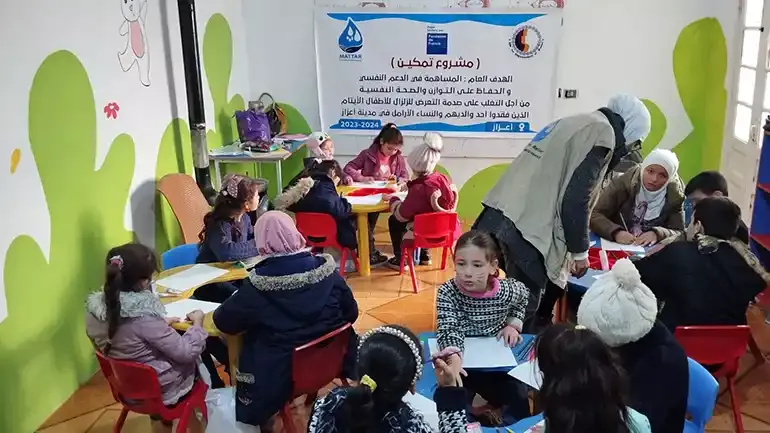Turkey-Syria: a year of stepping up where it mattered most
On February 6, 2023, southern Turkey and northern Syria were struck by two huge earthquakes, leading to the death of more than 50,000 people, and hundreds of thousands more injured and without shelter. One year on and the humanitarian situation is still worrying and basic needs remain significant in both countries. More than 120,000 donors (individuals, companies, and donor-advised funds) responded to Fondation de France’s appeal for donations, which raised €13.5 million.
A year ago, two quakes struck the south of Turkey and the north of Syria, devastating often very poor areas marked by extensive internal conflicts. Fondation de France stepped up to help the most vulnerable people, by relying on local organizations best able to respond. During that year, it focused on meeting essential needs, providing shelter and access to healthcare, especially for the most vulnerable: children, women, the elderly, disabled people, isolated populations, minorities and so on. Fondation de France has already spent almost €6 million for the implementation of 57 projects in the two countries. Currently at stake is the need to rebuild devastated regions and promote economic recovery, especially agriculture.
Providing essential aid
In order to meet the elementary needs of people affected by the earthquake, Fondation de France supports projects such as an association in northern Syria, which works with local authorities, to provide drinking water to 39 neighboring villages. This guarantees more sustainable access to water than distribution via a water truck. In Turkey, NGO TOKTUT has set up purification stations in container cities to respond to the needs in drinking water for victims in the areas most affected: Hatay, Gaziantep and Adıyaman.
In the towns of Idleb and Afrin in northwestern Syria, Fondation de France supports a local nonprofit which distributes food parcels to 2,500 families, amounting to around 12,500 people in total, including 6,000 women and 650 children. Proper lighting in welcome centers is also critical, so Fondation de France supports several initiatives to provide generators. In Jinderes, a town bordering Turkey which has become a very important place of refuge for many Syrians, supported local nonprofits work with the authorities to supply lighting. Twenty refugee camps, where more than 20,000 people live, are now equipped with solar lampposts. The 450 lighting units will be set up in main roads, tents and public facilities.
Protecting the most vulnerable
In order to improve access to healthcare, Fondation de France has contributed to purchasing medical equipment for the Afrin hospital (in Syria) and to organizing mental health services and psychosocial care. It has also supported nonprofit MEDAK, which has deployed mobile clinics to help out in damaged healthcare centers. These mobile clinics are mainly located in rural areas, eleven provinces of which were struck by the earthquake. They assist 5,000 women, monitor their pregnancy and vaccinate their children. The nonprofit has also developed a mobile healthcare app for easier access to healthcare for refugees.
In order to help destitute women, Fondation de France supports a nonprofit that assists around a hundred vulnerable women from Syria living alone with their children, in Idleb. They attend workshops and training programs to engage lastingly in the future, with sustainable revenue-generating activities. In Turkey, the KAMER foundation is building a center in Adıyaman to welcome 7,500 girls, women, elderly women, women with disabilities and women migrants and refugees. Work spaces, psychosocial support and play areas for children are also planned.
 Syrian women following pottery classes to promote the return to work. © D.R.
Syrian women following pottery classes to promote the return to work. © D.R.
Several projects focus on children: 6 million of them (nearly 2.5 million in Turkey, and 3.7 million in Syria) were affected by the two earthquakes. In particular, nonprofit Yeced works with Syrian refugee children in Turkey, who are particularly vulnerable. Yeced provides psychological support and equipment for schools, and a teaching program.
In rural Turkish regions, the mobile learning center of AÇEV, Child Friendly Center, goes round five villages with limited access to education to ensure that children can continue school and other activities in a secure environment. In Syria, in the towns of Aleppo and Azaz, a nonprofit supported by Fondation de France offers psychosocial support to almost 70 children who have lost their parents after the earthquake. The aim is to support them and help them overcome their trauma by way of various recreational activities, such as drawing, music or writing.
 Psychological support, such as drawing sessions, offered to Syrian children. © D.R
Psychological support, such as drawing sessions, offered to Syrian children. © D.R
Contributing to rebuilding and supporting agriculture
Rebuilding is a priority for the Turkish government. Turkish NGO IBC is leading a building project of around 40 prefabricated houses in the town of Kirikhan. With the input of building professionals, families take part in building their own home (carpentry, plastering, finishes etc.). All construction costs are taken care of and project beneficiaries will become the owners of their house. This project in Turkey is unique and pioneering and it has been undertaken with public agencies.
In the area most affected by the earthquake in northwestern Syria, Fondation de France supports a food sovereignty program for the most vulnerable agricultural communities and the preservation of the region’s agricultural heritage. The aim is to improve the resilience and food security of vulnerable populations thanks to the production and distribution of agricultural input.
TO FIND OUT MORE
→ Interview with Christine Robichon – “Solidarity with Turkey and Syria” Committee President
→ Emergencies: rebuilding lives over the long term

